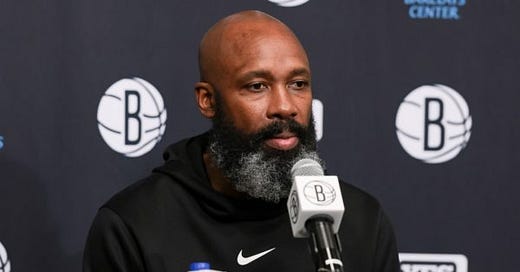Vaughn Can Shift Blame For Nets’ Slide For Only So Long Before Arrows Will Be Pointed At Him
It’s probably too soon to start talking about Nets Head Coach Jacque Vaughn’s job security. A confidante of General Manager Sean Marks going back to their days in San Antonio, Vaughn might have to lead his club much deeper down the hole than their current stretch that has seen the Nets (15-19) lose 10 of their last 13 games following Tuesday night’s 112-85 thrashing in New Orleans before Vaughn’ seat gets hot.
Still, Brooklyn’s noncompetitiveness in seven of those defeats, not to mention the embarrassment from dropping a six-point decision to a then 5-25 Washington squad, has many fans wondering how much more the organization can take before making a change. Though the Nets no longer boast a superstar personality who enjoys immediate access to the highest levels to enter complaints, the on-court product speaks for itself.
Vaughn’s own voice during this skid hasn’t really helped matters. Coaches, for better or worse, are a team’s front man, and they bear the brunt of criticism for poor performances. Or at least that’s what the good ones say publicly. They acknowledge that they are in charge of finding solutions. It goes back to the old adage. The world doesn’t want to hear about labor pains; it only wants to see the baby.
Prior to Tuesday’s debacle, Vaughn was asked why a team that sported a host of players with highly-regarded reputations as defenders has struggled so mightily this season—the Nets rank 24th in defensive rating, per NBA.com. Instead of going all Bill Belichick and simply saying, “We have to do better. I’ve got to fix it,” Vaughn went on for about two minutes blaming others and spewing many words that didn’t make sense.
Like how challenging it has been to get players from different systems around the league to play as a unit. As if he didn’t have a full training camp and this was Week 3. The big trades that brought in the core group happened 11 months ago. We’re nearly halfway through this season and the Nets still have breakdowns galore almost every night as if they just met each other on the team bus to the arena. To stick his foot further into his mouth, Vaughn then implied that his players often go rogue so that they can feel more comfortable with their individual defensive style. Fortunately for him, he stopped there before uttering names.
Vaughn was correct in that his club doesn’t force enough turnovers (they’re last in the league), but to then suggest that it was the main source of their troubles ignores all the other issues. It certainly didn’t help Brooklyn’s last two defensive efforts, where they forced 15 and 17 turnovers, respectively, at Oklahoma City and New Orleans. Despite that average of 16 forced turnovers per game, which would rank second in the league if maintained over a full season, the Nets surrendered 121 points per 100 possessions in those contests. Still no bueno.
Look, you don’t need more stats to comprehend what has been transpiring. Simply put, it’s been too easy for the Nets’ opponents to score. The space they get to shoot is generally far greater than what anyone else allows. Even in a make-or-miss league, it’s typically a lot easier to knock down shots when they’re not or barely contested.
Part of that is scheme and part is effort. Watch how defenders pretty much hug Mikal Bridges and Cam Thomas all over the offensive half. The Nets display none of that physicality. They don’t trap opposing stars to get the ball out of their hands, so there is too much penetration past the point of attack. I can’t count how many times a Nets help defender pinched in on the first dribble such that he left his own man wide open for a catch-and-shoot three-pointer. The recurring nature is an indication that it’s systemic.
The Nets give up the sixth-fewest points per in the paint per game—fantastic. They’re also 26th in three-point makes and three-point percentage allowed. The math works the same on defense as it does in Vaughn’s three-point heavy offensive philosophy.
Speaking of which, the Nets’ own shooting has been regressing to their mean. In many of their last 13 games, they’re still jacking them up at a relatively high (though likely not high enough for Vaughn’s voracious appetite where any low-quality 3 is better than an open 2) rate, but they’re converting only 34.1% of them, the sixth-worst percentage in the NBA over that span. Worse, they’ve been prone to stretches where they’ll miss a bunch in a row, feeding opponents’ transitions. Brooklyn has surrendered the fourth-most fast break points per game during this slump.
In many cases, the Nets’ floor balance has been askew. Sometimes, it’s because they’re sending too many people to the offensive glass. On most others, though, even Vaughn has admitted that the effort to get back hasn’t been adequate. If you’re jogging the first few steps after a missed shot while an opponent is sprinting ahead, you’re toast.
The bare minimum to keep a losing coach around is that the team plays hard. The Nets do so in pockets, but can anyone argue that sustaining it for the vast majority of a game has been on more than sporadic occasions?
At least Vaughn never pointed to inexperience. This is not that young of a team. The average age of Brooklyn’s starting five for the last three games has been 27.6. Before that, when Thomas was starting, it was still 26. The point being they know how to play ball.
They’re just playing it terribly. There are many reasons why, not just coaching. But if this spiraling continues for much longer, the arrows will eventually be pointed at Vaughn.



